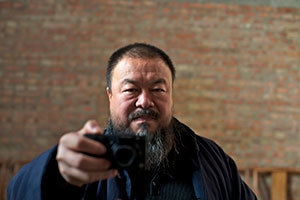 Chinese contemporary artist Ai Weiwei
Chinese contemporary artist Ai Weiwei
The 2013 ScreenPeace Film Festival, which takes place Jan. 31 through Feb. 2 (Thursday through Saturday), showcases the real lives of courageous people — a Palestinian farmer, a Chinese artist, a scholar of revolution, an interracial couple, a young Algerian filmmaker — who use nonviolent means to confront injustice and oppression.
The festival is a partnership between the University of Notre Dame’s Kroc Institute for International Peace Studies and the DeBartolo Performing Arts Center. Faculty experts introduce each film and lead post-screening discussions.
All films are free but ticketed. Order at performingarts.nd.edu or call the ticket office at 574-631-2800 to reserve tickets.
“Five Broken Cameras” (7 p.m., Jan. 31) is an Oscar-nominated documentary about nonviolent efforts in the Palestinian village of Bil’in to stop the building of the separation wall and settlements. Discussion led by Atalia Omer, assistant professor of religion, conflict and peace studies.
“Ai Weiwei: Never Sorry” (6:30 p.m., Feb. 1) features the work of Chinese contemporary artist Ai Weiwei, who combines art and activism like no one else. Discussion led by Lionel Jensen, associate professor of East Asian Languages and Cultures.
“How to Start a Revolution” (9:30 p.m., Feb. 1) focuses on Gene Sharp, a leading scholar of nonviolent resistance, whose approach has shaped movements in Egypt, Tunisia, Iran, Serbia, Venezuela, Burma and elsewhere. Discussion led by David Cortright, director of policy studies at the Kroc Institute.
“The Loving Story” (6:30 p.m., Feb. 2) tells the poignant story of Richard and Mildred Loving, whose landmark 1967 civil rights case ended all race-based restrictions on marriage in the United States. Discussion led by Richard Pierce, associate professor of history and chair of Africana studies.
“Normal!” (9:30 p.m., Feb. 2) is an unconventional “film within a film” that mixes documentary and fiction in response to the challenges of Algerian youth in a changing Middle East. Discussion led by Alison Rice, associate professor of French.